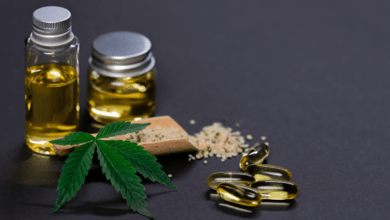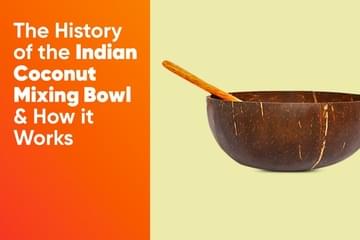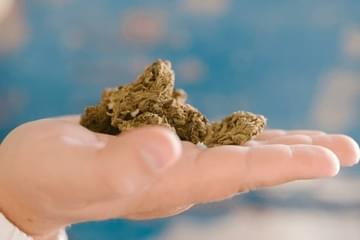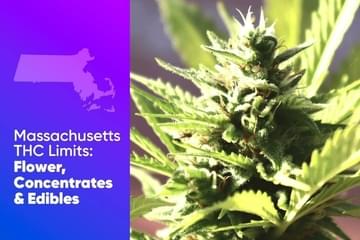
Is THCV an Appetite Suppressant?
Published on 1/16/23
Tetrahydrocannabivarin (THCV), the cannabinoid often referred to as "diet weed," is known for its energizing and appetite-suppressing effects.
Preliminary studies show promise for its potential therapeutic activity in weight control, reduced food intake, and glycemic control. THCV is naturally found in small amounts in some cannabis strains and is increasingly marketed to control the munchies.
Read on to learn more about THCV and its potential appetite-suppressing effects.
What is THCV?
THCV is a naturally occurring analog of tetrahydrocannabinol (THC), the cannabinoid responsible for the psychoactive effects of cannabis. The cannabinoids differ slightly in their molecular structure because THCV has a shorter hydrocarbon chain than THC.
THCV is present in cannabis plants in trace amounts, and a few cannabis strains have more abundant quantities. Processors extract it from hemp to derive larger quantities for cannabis products.
THCV effects
The effects of THCV are mediated by CB1 and CB2 receptors in the endocannabinoid system. Researchers have studied multiple effects of THCV, including appetite, glycemic control, and mitigation of THC effects.
Does THCV Reduce Appetite? Does THCV Help Diabetes?
THCV may suppress appetite, but researchers are still unsure how it works.
A study designed to test food reward and aversion in healthy volunteers found that THCV caused increased neural responses to rewarding and aversive stimuli. The results indicate that THCV has potential therapeutic uses for preventing or treating obesity.
Studies in mice treated with THCV showed that they ate less food and lost weight. Another study showed no effect on weight or food intake, but the mice treated with THCV had improved glucose tolerance and increased insulin sensitivity.
In a 13-week double-blind, placebo-controlled trial of people with type 2 diabetes, THCV significantly decreased fasting plasma glucose and improved pancreatic beta cell function. However, there were no significant differences in appetite or body weight. The researchers concluded, "THCV could represent a new therapeutic agent in glycemic control in subjects with type 2 diabetes."
Overall, scientific research shows the potential for THCV to help with appetite and glycemic control, but further studies are needed to determine the effects.
THCV Weight Loss
Could THCV be effective for losing weight? Consumers are drawn to THCV weight loss products and supplements for appetite-reducing and energizing effects.
It's too soon for experts to know whether these products are effective for weight loss, but the results are promising. Expect to see more THCV supplements marketed for weight loss, appetite, and glycemic control as cannabinoid science advances.
 Pexels
PexelsIs THCV Psychoactive? Does THCV Balance THC's Effects?
Unlike THC in cannabis, the initial evidence suggests that THCV is not intoxicating or psychoactive.
Anecdotally, THCV is thought to reduce THC's psychoactive or unwanted side effects, and the mitigation may be dose-dependent. However, further studies are needed to know how THCV and THC work together in the body.
A small placebo-controlled study of 10 cannabis users found that THCV inhibited some of the well-known effects of THC while potentiating others. Participants who took THCV reported the THC effects to be subjectively weaker or less intense. THCV reduced delayed verbal recall and increased heart rate.
Other Potential Effects of THCV
Scientists are working to determine the effects of THCV and its potential for therapeutic uses in various conditions.
In mice studies, THCV has shown promise for its potential to reduce Parkinson's disease symptoms. It has also been shown to decrease signs of epilepsy and inflammation in mice.
THCV has shown potential in preliminary studies as an anti-acne agent, therapy for fatty liver disease, and treatment for psychosis.
The results are promising, but more data is needed. The body of research is still developing. THCV is likely a cannabinoid of growing interest in future studies because of its wide range of potential therapeutic uses.
THCV Side Effects
According to the limited scientific studies conducted so far, THCV doesn't seem to have significant side effects. More studies may lead to the discovery of side effects or safety issues. In the meantime, consult your doctor to know if THCV or cannabis is right for you.
Is THCV Legal?
THCV is considered legal in most states under federal law.
With the passage of the 2018 Farm Bill, the sale of hemp-derived cannabinoids and products was legalized in most of the United States, including THCV. As long as THCV is extracted from hemp plants containing less than 0.3% THC, it's legal.
Popular THCV Strains
THCV is only present in small amounts in some strains of cannabis, but its growing popularity has led to an interest in strain-selective genetics to produce more THCV.
Here are some of the most popular THCV strains:
AC/DC
Well regarded for its ability to leave users happy, relaxed, and uplifted thanks to its hybrid nature, AC/DC is great for medical patients. It leads with flavors and aromas of wood, spicy herbs, and a rich, earthy taste on the exhale. Are you looking to take the edge off issues like epilepsy, chronic pain, and anxiety or stress? This strain is perfect for you.
Durban Poison

Often referred to as the sativa of all sativas, Durban Poison is one of the early sativa strains and is the epitome of sativa effects. With an average THC content of 17%, Durban Poison is known to be uplifting and can help with creativity. With a citrusy flavor and frosty trichomes, it's a great strain to turn into concentrates.
Girl Scout Cookies
One of the best strains for high THC content, Girl Scout Cookies has an average of 25% THC. Its balance of indica and sativa means you can expect a strong body high with euphoria and social feelings. This strain is popular with medical patients and is known to help with pain and nausea. You'll enjoy an earthy-sweet aroma and a slightly minty chocolate flavor.
Tangie

This flavorful sativa strain is perfect for an energizing experience without getting too high. Created to replicate Tangerine Dream, which was popular in the 90s, Tangie is known for its sweet, citrus flavor. With a typical THC range of 17-20%, this strain will leave you feeling energetically high and creative.
Willie Nelson
Willie Nelson is a sativa-heavy strain known for its creative and euphoric effects. It'll leave you with a clear mind, a mood boost, and even a kick of energy to get you going. With an average THC content of 22%, this potent strain is excellent for medical patients. Try Willie Nelson to combat anxiety, stress, chronic pain, and nausea.
Other Strains High in THCV
- Doug's Varin
- Malawi Gold
- Pineapple Purps (aka Purple Pineapple)
- Pink Boost Goddess
- Power Plant
- Red Congolese


















